七年级英语下Unit11学案4
牛津译林英语七年级下册Unit4学案(附答案)

牛津译林英语七年级下册Unit4 讲学案一.重点单词1.follow跟随;仿效2.north北,北方3.west西,西方4.south南,南方5.east东,东方6.trip旅行,旅游7.straight径直地8.along沿着,顺着9.remember记得,记住10.dangerous危险的11.quite相当,非常12.bridge桥13.outside(在)外面14.treasure宝藏15.corner拐角,街角;角落二.重点词组1.have to不得不,必须2.go straight on笔直走,径直走3.walk along沿着……走4.prepare...for...为……准备…5.above the drinks 在饮料上方6.no problem 没问题7.traffic lights 红绿灯8.plenty of 大量,足够9.look forward to doing sth.期待做某事重点句型及点拨1.Are you sure, Hobo?be sure of sth. 对……确信(有把握)be sure to do sth. 一定要去做某事be sure +that从句I am sure of my answers. 我对我的答案有把握。
They are sure to win the game. 他们一定会赢得比赛。
I think we have to go up again.我认为我们不得不再上去了。
have to意为“不;得不",强调客观。
must和have to的区别是:must表示说话人的主观思想,have to表示客观需要。
有时两者可以替换。
如:My bike is broken,so I have to walk to school.我自行车坏了,因此我不得不步行上学。
You must finish the homework today.今天你必须完成家庭作业。
人教版英语七年级下册【推荐】Unit11Howwasyourschooltrip(学案2)
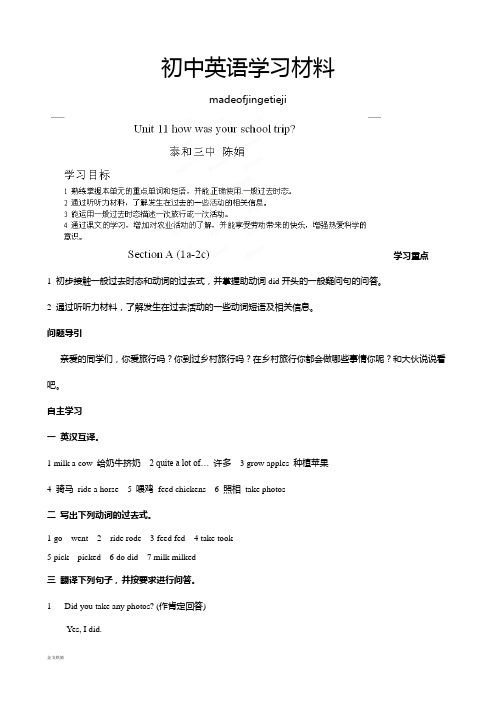
初中英语学习材料madeofjingetieji学习重点1 初步接触一般过去时态和动词的过去式,并掌握助动词did开头的一般疑问句的问答。
2 通过听听力材料,了解发生在过去活动的一些动词短语及相关信息。
问题导引亲爱的同学们,你爱旅行吗?你到过乡村旅行吗?在乡村旅行你都会做哪些事情你呢?和大伙说说看吧。
自主学习一英汉互译。
1 milk a cow 给奶牛挤奶2 quite a lot of… 许多3 grow apples 种植苹果4 骑马ride a horse5 喂鸡feed chickens6 照相take photos二写出下列动词的过去式。
1 go went2 ride rode3 feed fed4 take took5 pick picked6 do did7 milk milked三翻译下列句子,并按要求进行问答。
1 --- Did you take any photos? (作肯定回答)--- Yes, I did.2 ----Did they grow apples? (作否定回答)---- No, they didn’t.3 ---- Did he eat strawberries? (作否定回答)----No, he didn’t.四完成课本1a部分。
合作探究任务一和小组成员一起讨论一下问题。
1 Does your school have any school trips?2 What do you usually do on your school trip?图片1 参观博物馆visit museums图片2 爬山go to the mountains图片3 去农场go to the farm图片4 去动物园go to the zoo3 How was your last school trip?任务二1 听课本1b的录音,圈出Carol所做的三件事情,并按要求完成1c当中的对话练习。
人教版英语七年级下册教案:Unit11 How was your school trip? Section B(3a-Self Check)
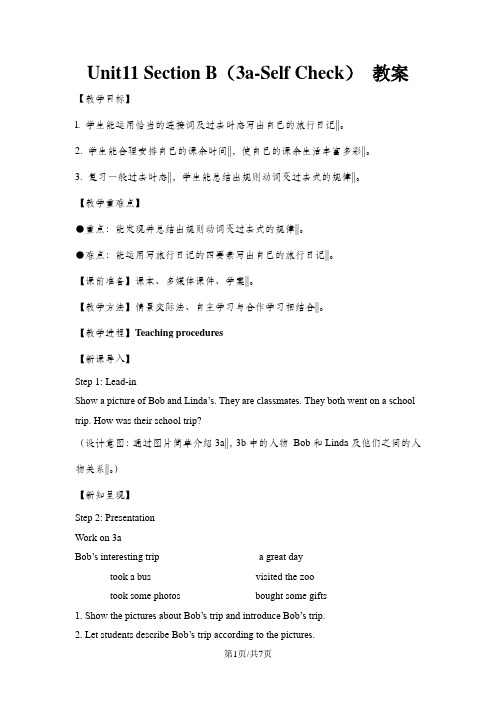
Unit11 Section B(3a-Self Check)教案【教学目标】l. 学生能运用恰当的连接词及过去时态写出自己的旅行日记||。
2. 学生能合理安排自己的课余时间||,使自己的课余生活丰富多彩||。
3. 复习一般过去时态||,学生能总结出规则动词变过去式的规律||。
【教学重难点】●重点:能发现并总结出规则动词变过去式的规律||。
●难点:能运用写旅行日记的四要素写出自己的旅行日记||。
【课前准备】课本、多媒体课件、学案||。
【教学方法】情景交际法、自主学习与合作学习相结合||。
【教学进程】Teaching procedures【新课导入】Step 1: Lead-inShow a picture of Bob and Linda’s. They are classmates. They both went on a school trip. How was their school trip?(设计意图:通过图片简单介绍3a||,3b中的人物Bob和Linda及他们之间的人物关系||。
)【新知呈现】Step 2: PresentationWork on 3aBob’s interesting trip a great daytook a bus visited the zootook some photos bought some gifts1. Show the pictures about Bob’s trip and introduce Bob’s trip.2. Let students describe Bo b’s trip according to the pictures.3. Look at the pictures and complete Bob’s diary.(设计意图:通过图片及一些短语介绍并描述Bob的旅行||,为补全Bob的旅行日记作了铺垫||,同时也降低了难度||,也符合学生的认知规律——由输入到输出||。
Unit11Howwasyourschooltrip(SectionB3a-SelfCheck)教学案(人教新目标七年级下册)
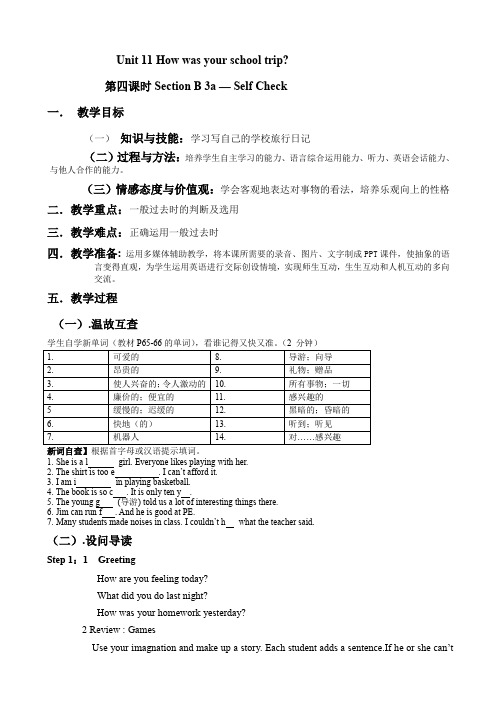
Unit 11 How was your school trip?第四课时Section B 3a — Self Check一.教学目标(一)知识与技能:学习写自己的学校旅行日记(二)过程与方法:培养学生自主学习的能力、语言综合运用能力、听力、英语会话能力、与他人合作的能力。
(三)情感态度与价值观:学会客观地表达对事物的看法,培养乐观向上的性格二.教学重点:一般过去时的判断及选用三.教学难点:正确运用一般过去时四.教学准备:运用多媒体辅助教学,将本课所需要的录音、图片、文字制成PPT课件,使抽象的语言变得直观,为学生运用英语进行交际创设情境,实现师生互动,生生互动和人机互动的多向交流。
五.教学过程(一).温故互查新词自查】根据首字母或汉语提示填词。
1. She is a l girl. Everyone likes playing with her.2. The shirt is too e. I can’t afford it.3. I am i in playing basketball.4. The book is so c . It is only ten y.5. The young g (导游) told us a lot of interesting things there.6. Jim can run f . And he is good at PE.7. Many students made noises in class. I couldn’t h what the teacher said.(二).设问导读Step 1:1 GreetingHow are you feeling today?What did you do last night?How was your homework yesterday?2 Review : GamesUse your imagnation and make up a story. Each student adds a sentence.If he or she can’tadd a sentence,he or she must sing an English song.Step 2 : Preparation1.3a Look a t the pictures of Bob’s school plete his diary entry.2. 3b Linda is Bob’s classmate. Complete her diary entry.Step 2 : Writing3c Now write a diary entry for your own school trip.Explain if you liked it or didn’t like it a nd why.Step 3 : Self-check1 Write more verbs and their past forms in each group.2 Complete the conversations with the correct forms of the verbs in the box.3 Check the answers4 Grammar: The Simple Past Tense(三)自我检测Mike’s summer vacationOn July 18th,2012, Mike and his parents went to Qingdao, a city in Shandong for summer vacation. Qingdao is a beautiful city with sea.It was about 12:00 when they arrived there on the first day. They found a hotel and had a short rest. It was really hot and they decided to go to the beach. At about 3:30 pm, they got to the beach. There were many people there. Some were lying on the beach and many children were playing in the water. Mike was playing with them and he was very happy. His parents also felt relaxed. About two hours later, they went back to the hotel.On the second day, it rained all day. Mike visited the history museum with his father and his mother went shopping.On July 20th, they went to Laoshan Mountain in the morning and took a bus home in the afternoon. They were tired but happy.( ) 1. Where did Mike’s family go on vacation? A. To Shanghai. B. To Tianjin.C. To Qingdao.( ) 2. What did Mike’s father do on July 19th?A. He swam in the sea.B. He visited the history museum.C. He went shopping with Mike’s mother.( ) 3.How long was their vacation? A. One day. B. Two days. C. Three days.( ) 4. How did they go back home? A. By train. B. By bus. C. By plane.( ) 5. Which of the following is true?A. It rained on July 19th.B. They went shopping on July 20th.C. Mike didn’t play in the water on the first day.(四).巩固训练:一、阅读理解。
人教版七年级下学期英语学案设计:Unit 4 Don’t eat in class
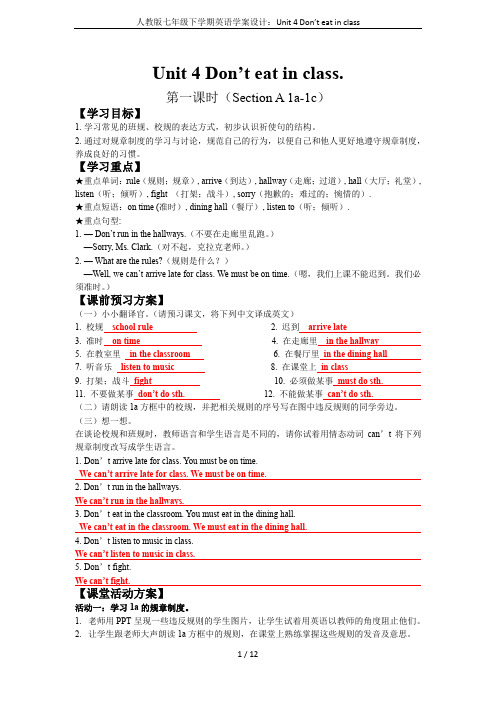
Unit 4 Don’t eat in class.第一课时(Section A 1a-1c)【学习目标】1.学习常见的班规、校规的表达方式,初步认识祈使句的结构。
2.通过对规章制度的学习与讨论,规范自己的行为,以便自己和他人更好地遵守规章制度,养成良好的习惯。
【学习重点】★重点单词:rule(规则;规章), arrive(到达), hallway(走廊;过道), hall(大厅;礼堂), listen(听;倾听), fight (打架;战斗), sorry(抱歉的;难过的;惋惜的).★重点短语:on time (准时), dining hall(餐厅), listen to(听;倾听).★重点句型:1.— Don’t run in the hallways.(不要在走廊里乱跑。
)—Sorry, Ms. Clark.(对不起,克拉克老师。
)2.— What are the rules?(规则是什么?)—Well, we can’t arrive late for class. We must be on time.(嗯,我们上课不能迟到。
我们必须准时。
)【课前预习方案】(一)小小翻译官。
(请预习课文,将下列中文译成英文)1. 校规school rule2. 迟到arrive late3. 准时on time4. 在走廊里in the hallway5. 在教室里in the classroom6. 在餐厅里in the dining hall7. 听音乐listen to music 8. 在课堂上in class9. 打架;战斗fight 10. 必须做某事must do sth.11. 不要做某事don’t do sth. 12. 不能做某事can’t do sth.(二)请朗读1a方框中的校规,并把相关规则的序号写在图中违反规则的同学旁边。
(三)想一想。
在谈论校规和班规时,教师语言和学生语言是不同的,请你试着用情态动词can’t将下列规章制度改写成学生语言。
2023年外研版七年级英语下册Module11 Unit2 Here are some ways t
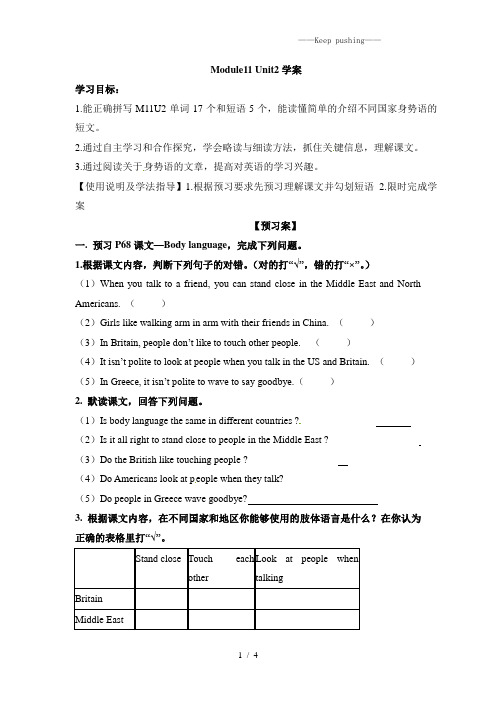
Module11 Unit2学案学习目标:1.能正确拼写M11U2单词17个和短语5个,能读懂简单的介绍不同国家身势语的短文。
2.通过自主学习和合作探究,学会略读与细读方法,抓住关键信息,理解课文。
3.通过阅读关于身势语的文章,提高对英语的学习兴趣。
【使用说明及学法指导】1.根据预习要求先预习理解课文并勾划短语 2.限时完成学案【预习案】一. 预习P68课文—Body language ,完成下列问题。
1.根据课文内容,判断下列句子的对错。
(对的打“√”,错的打“×”。
)(1)When you talk to a friend, you can stand close in the Middle East and North Americans. ( )(2)Girls like walking arm in arm with their friends in China. ( )(3)In Britain, people don’t like to touch other people. ( )(4)It isn’t polite to look at p eople when you talk in the US and Britain. ( )(5)In Greece, it isn’t polite to wave to say goodbye.( )2. 默读课文,回答下列问题。
(1)Is body language the same in different countries ?_______________(2)Is it all right to stand close to people in the Middle East ?__________________(3)Do the British like touching people ?__________________ _(4)Do Americans look at p eople when they talk?_________________________(5)Do people in Greece wave goodbye?3. 根据课文内容,在不同国家和地区你能够使用的肢体语言是什么?在你认为正确的表格里打“√”。
七年级英语下册学案及答案教案
七年级下册学案Unit 1 Where’s your pen pal from?Section ATeacher’s words: Actions speak louder than words.知识目标:1. Words: Canada, France, Japan, the United States, Australia, Singapore, the United Kingdom,Sydney, New York, Pairs, Toronto, Tokyo, French, Japanese, pal, country, live, language, world, like, dislike.2. Phrases: talk about, be from/ come from, pen pal, speak English, a little与little 的区别,myfavorite subject, tell sb. about sth, like doing sth.3. Important sentences: 1) --- Where’s your pen p al from?2) --- Where does he live?3) --- What language does he speak?4) ---- What’s your favorite subject?预习检测:1.来自______________2.笔友______________3.做运动______________4.讲英语______________5.给某人写信______________6.住在______________7.一点法语______________ 8. 太难______________9.去看电影______________ 10.喜欢做某事______________情景导入:1. To show a photo of Sydney and talk about it.2. To ask the students some questions.自主探究:1. The students open the books, turn to Page 81 and read the first letter. After that, the students answer three simple questions.2. The students read after the tape and go on answering some more questions.Ⅳ、合作交流:1.The students read the letters that the teacher gives them and then choose one pen pal they like.2.Do a report.My partner’s nam e is _________. His new pen pal’s name is ________.He is _______ years old. He is from __________.He lives in ___________. At school, he likes ______________.His favorite ___________ is __________________.I think he can be my partner’s pen pal. Do you think so?拓展创新:Groupwork1.Discussion: In your group, do you like your pen pals? Who likes? Why? ( Tell some reasons )2.Report.In our group, ________of us lik e his pen pal. Because his pen pal …达标测试:一、首字母填空1. She l_______ in Bei Hai.2. What l _______does Maria speak?3. Where are your friend f_______?4. King’s f_______ movie is the Long Weekend.5. China is a great c_______ .6. Mr. Brown is from A_______.7. Can he speak J_______ ?8. Rush Hour is an action m _______ .9. It is an i_______ story.10. J_______ is the seventh month in the year.二、单选( )1. _______ do you come from?A. WhenB. HowC. WhereD. Why( )2.Sam likes_______ his friends.A. to playB. playsC. play withD. playing with( )3.She lives_______ Sydney.A. atB. onC. inD. behind( )4.Where_______ she ? ---In Australia.A. do; liveB. does; livesC. do; livesD. does; live( )5.Do you want_______ French?A. to learn B learns. C. learning D. learn三、完形填空:阅读下面短文,掌握其大意,然后从各题所给的四个选项中选出最佳答案,并将其标号填入括号内。
Unit11复习学案
九年级英语学案Unit11 Sad movies make me cry.一、词组1. 使某人发疯________________________2.宁愿___________________3.越------越-----______________________4.成为某人的朋友____________________5.忽略,遗漏不包括__________________6.宁愿----而不愿______________________7.像平常一样________________8.首相,大臣___________________________9.招来,叫来____________________ 10. 既不----也不---_____________________ 11.没有理由_______________________ 12.在三天时间里______________________ 13.起初,开始时___________________ 14.被--------跟着_______________________ 15.想要做某事_____________________ 16.发现---没有问题_____________________ 17.代替某人的位子________________ 18.失去某人的权力_____________________ 19.搜寻,寻找某人/某物_________________ 20.在----寻找____________________________ 21.搜身/搜查某地_____________________ 23.同意某人_____________________________ 24.做某事花费某人一段时间_________________________ 25. 同意做某事_________________ 26.使失望___________________ 27. 开除某人______________________28.而不是_____________________ 29.对某人苛刻_____________________30.齐心协力____________________ 31. 留神,警惕_________________________ 32.和---交流___________________ 33.从某人的错误吸取教训_________________ 34.继续做某事_____________________ 35.勇敢地__________________________ 36.把如此多的压力放在---上_________________________ 37.进门_________________ 38.敲门_______________________ 39.接近,差一点________________________ 40.停止思考_______________________ 41.射门得分____________________________ 二.句子翻译1. He said ___________________________________________________________.(drive)(一直等她使我发疯)2.His father ________________________________________________.(would rather)(宁愿步行去工作也不愿开车)3.Ann __________________________________________________________________. (enter) (自从我进入这个学校Ann就一直是我的一个好朋友)4.You __________________________________________________________. (leave)(已经漏掉了这个句子里最重要的词)5.This was ____________________________________________________________.(make)(如此悲伤的一部电影以致于使我们都哭了) 6. The head teacher ________________________________________ who broke the window of our classroom.(叫来几个学生询问) (call)7.________________________________________________________________ .(他和我对唱歌和跳舞都不感兴趣) (neither)8.Although ___________________________________________________________. (make)(他有很多权利,但是权利不能使他快乐)9.Finally, the King’s top general __________________________________________________.( 被告知在三天之内出去找到一个快乐的人)(tell)10.The singer said he ____________________________________________________________.(总是担忧被其他人跟踪)(follow)11.Could you please tell me ____________________________________________?(每天步行从你家到学校花费你多长时间)(take)12.那位上将花了多长时间找到那个快乐的人?(take)How long_________________________________________________________?13.________________________________________________________________________ fame?(你知道既使他没有权利、金钱或名望,什么使他每天如此开心吗) (even though)14. 昨天这个时候警察正在森林里寻找走失的孩子。
2024英语学案第1课时SectionA1a-2d 分层作业设计(人教版七年级下)附答案
Unit1 Can you play the guitar作业设计课时1:[ Section A (1a-2d) ]建议时间:15分钟第一部分课堂练习作业(必做题)夯基础I 我会听(教材变式)根据2b听力内容,补全下面对话。
B ob:Here are all the 1________________Mary:What club do you want to 2_________________,Bob?Bob:I want to join the 3._________________club.I like to speak English.How about you? Mary:Hmm,I want to join the chess club.Can you 4.____________chess?Bob:No,I don't like chess.Do you like 5. ______________Mary:Oh,yes.I can sing and dance.I like music.Bob:Me.too.6.______________ join the music club.II.我会填(教材变式)Jane:Hi,Bob.What club do you want7. _________(join)?BOb:I want to join a 8. _______________(运动俱乐部).Jane:Greal!What sports can you play?B0b:Soccer.Jane:So you can join the 9__________(足球俱乐部).Bob:What about you?You're very good at 10___________(tell) stories. You can join 11_______________(讲故事俱乐部).Jane,Sounds good. But I like to draw,too.Bob:Then join two clubs,the story telling club and the art club!Jane;OK,let's 12_________( join) now!Ⅲ.我会选(原创)根据语境及所给图片提示,写出所缺单词13.Mary likes to ________ on Saturday afternoon.14.We're in the music club, and we ________every day.15.Jack likes to ________ pictures.16.—Can the bear ________?—Yes, it can dance well.17.Lily likes to play the ________ in the park.练能力IV阅读理解(改编)(限时练5分钟)Helen likes erhu music. One of her classmates Zheng Jie is in the erhu club at school. He often plays the erhu for the school music festival.One day after school, Helen says to her mom, “The erhu music Zheng Jie plays is so great. I also want to learn it. I want to take some erhu lessons, Mom.”“I don't think you can do so much. It takes much time to learn the erhu,” Mom says. “Now you are in the art club and the dance club in your school. You have to draw and dance. Are you sure you have time for the erhu?”Helen knows Mom is right. If she wants to learn the erhu, she will have to give up (放弃) a club. Helen loves her clubs and she doesn't want to do that.“Why don't you dance when Zheng Jie is playing the erhu?” Helen's mom says. “You can dance and enjoy (欣赏) the music at the same time (同时).”“Sounds great!” Helen says. “I'll go and ask Zheng Jie.”( )18.What can Zheng Jie do?A.Play the pipa.B.Play the guzheng.C.Play the erhu.D.Play the dizi.( )19.What does the underlined word “learn” mean in Chinese?A.学习B.忘记C.创造D.编织( )20.What may (可能) Helen do at last (最后)?A.Give up the art club.B.Dance and enjoy the erhu music at the same time.C.Learn erhu with her mother.D.Let Zheng Jie learn to dance.答案I.1 clubs2 join3 English4 play5 music6 Let’sII7 to join 8 sports club 9 soccer club 10 telling 11.the story telling chub 12joinIII.13.swim 14.sing15.draw 16.dance17.guitarIV【主旨大意】本文主要讲述的是Helen想要参加二胡俱乐部,于是与妈妈商讨是否可以参加二胡俱乐部,妈妈不愿意让俱乐部过多占用Helen的时间,于是给出了一个折中的主意。
七下英语Unit 11 学案
Unit 11 Section A (1a-2c)【学习目标】掌握新单词及一般过去时,并谈论过去的事情。
【自主探究】1.回忆一般现在时态与现在进行时态的定义1) 小明经常打篮球。
____________________________________.此句为____________时态,表示______________________的动作,常与时间状语often ________ ________等连用。
2) 小明现在正在打篮球。
____________________________________.此句为____________时态,表示______________________的动作,常与时间状语now等连用。
2. 一般过去时态的定义:表示过去某一段时间发生的动作或存在的状态,也表示过去常常或反复发生的动作,常与表示过去的时间状语连用,例如last year,yesterday,yesterday morning, in 1998, two days ago, this morning, just now 等等。
一般过去时态的构成, 详见书114页。
※有些动词的过去式变化是不规则的, 详见书141页。
练一练:我去年在一家医院上班。
I _______ in a hospital ______ _______.否:I ________ _______ in a hospital ________ ______.一疑:_____ you ______ in a hospital _______ _________?Yes, I _______. / No, I __________.划线提问:_____________________________________________________________________________3. I learned something. 翻译:______ you _______ __________? Yes, I did.I _______ _________ ___________. (否定句) = I __________ ____________.4.- Did you see any cows ?- Yes, I did . I saw quite a lot (of cows) 翻译:_____________________ 【夯实基础】1. We _________(enjoy ) ourselves last weekend.2. Tom played football yesterday afternoon.(否)Tom _______ _______ football yesterday afternoon.3. _________ (be) it cold in your city yesterday?4. 昨天下午我去看望我叔叔了。
- 1、下载文档前请自行甄别文档内容的完整性,平台不提供额外的编辑、内容补充、找答案等附加服务。
- 2、"仅部分预览"的文档,不可在线预览部分如存在完整性等问题,可反馈申请退款(可完整预览的文档不适用该条件!)。
- 3、如文档侵犯您的权益,请联系客服反馈,我们会尽快为您处理(人工客服工作时间:9:00-18:30)。
导学课题: Unit 11 How was your school trip?
Section B 1a — 1d (P64)
主备人:孟巍总第64课时审阅:
【学习目标】
继续进一步学习和谈论过去事件。
【学习重点】:1b部分听力练习。
【学习过程】:
学习任务一、预习课本P64,写出列短语和单词。
1. 去动物园___________________
2. 爬山___________________
3. 参观博物馆_______________
4. fire station ______________
5. painting ____________________
6. 画画__________________
学习任务二:
I、新课呈现
Step1 Review & Lead-in
Grammar Focus
Step2 Presentation
1.Learn and finish 1a. Then try to remember the phrase.
2.Game: Quick action about the phrases.
eg: A: 钓鱼. B: go fishing
3.Make sentences by using the phrases in 1a as following.
-- I went to the zoo last weekend.
-- He climbed a mountain with friends yesterday.
Step3 Listening
1.Go through the questions in 1a and the chart in 1c quickly.
2.Listen and answer the questions in 1b.
3.Listen again. What did Jane and Tony do on their last school
trip? Check Tony or Jane. Then check the answers.
Step4 Pair work
Ask and answer questions according to the order form.
II、合作探究
Group work: 总结归纳How…?句型, 如何回答? 请举例说明。
Notes:___________________________________________________ 【课堂检测】:课时笔记I、写出下列动词的过去式。
1.visit____________
2.climb_____________
3. pick_______________
4.grow__________
5.draw ____________
6. ask _______________
7.study___________8.learn_____________ 9. can_______________
10. buy ___________11.teach___________12. eat_______________
II、阅读练习
In England, people don’t talk to each other when they travel. If you
get on a bus, or in a train, you will sometimes see people sitting and
looking out of the window. Other people will be reading books or
newspapers.
When you meet English people, they often begin a conversation by
talking about the weather. So when you meet somebody in England, you
can say, “Nice weather for the time of the year!”
“But it was a little cold yesterday,” somebody may answer.
“But it will get a little warmer later,” you can say.
Talk like this, and the English will think, “How friendly you are!”
( ) 1. English people often ___________ on the bus.
A. talk a lot
B. talk to each other
C. read
newspapers
( ) 2. When you meet an English people, you can begin the conversation
by talking about the __________.
A. weather
B. time
C. food
( ) 3.According to the passage, if you talk to English people about the
weather, they will think you are ___________.
A. English.
B. right
C. friendly
( ) 4. Which sentence is true?
A. English people like traveling by bus.
B. English people are unfriendly.
C. English people don’t talk much when they’re by train.
【课后反思】
1.我的收获:
2.感到自己有待加强的是:
课时笔记。
